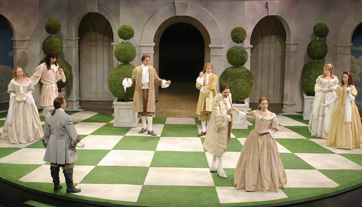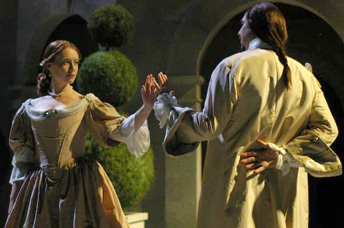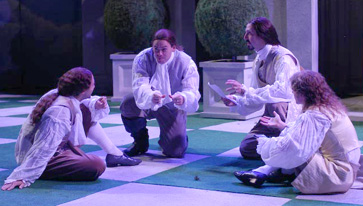Summary 
Late 18th-century costuming enhances the outdoor romantic game-playing, staged on an over-sized green-and-white checkerboard with the players like game pieces. Characters swing wildly in emotional extremes - from outrageously stiff and affected with over-the-top accents to hyper-active puppy-love idiots - until finally brought to an emotional balance by sudden bad news. A memorably wrought if suddenly somber conclusion.
Design
Directed by Stephen Fried. Set by Aleksandra Maslik. Costumes by Jennifer Moeller. Lights by Julie Mack. Sound by Joshua Horvath.
Cast
Ed Swidey (King Ferdinand), Eddie Collins (Berowne), Kelsey Nash (Longaville), Evan Fuller (Dumaine), Elizabeth Larson (Princess), Elizabeth Audley (Rosaline), Emily Young (Katherine), Crystal Finn (Maria), Matt Daniels (Boyet), Christopher Oden (Don Armado), Henson Keys (Holofernes), Christopher Hirsh (Nathaniel).
Analysis
Stephen Fried of the Shakespeare Theatre Company in Washington D.C. directs an outdoor Love's Labour's Lost for the Illinois Shakespeare's thirtieth anniversary season. Fried's vision - pretentious courtiers in long curly hair and elaborate costuming looking as if they'd just emerged from an Alexandre Dumas novel - furthers the overall maturity theme of the other productions on the Festival slate. This production is particularly complemented by Much Ado About Nothing, especially in the mirroring soliloquies. Like Benedick, each of the four young Love's Labour's men (and especially Berowne) directly addresses and involves the audience, bemoaning their romantic fates even while relishing the liberation and emotion. Both productions also feature insipid male characters being outwitted and deceived by double-disguised women during a masque, as well as an idiot constable, with Dull in Love's Labour's playing like an early draft of Dogberry.

The lighthearted romantic game-playing - all the moves and counter-moves of courtship - take place on a green and white checkerboard, the silly characters much like game pieces on an over-sized playing field. Puffy white clouds are painted on an azure sky backdrop above, and circular bushes like green snowmen provide the King and his cohorts ample places to hide and spy on one another.
Supporting characters are powdered, wigged, and attired in stiffly elegant late 18th-century costuming, and Armado and Boyet speak with flamboyant accents. And the King of Navarre, Ferdinand, painstakingly adamant about an austere life of study for he and his friends, seems to crack open, and Ferdinand stumbles and flounders comically when faced with the possibility of romance. The King sometimes breaks the fourth wall to engage and seek assistance from the audience. At one point, Ferdinand shushes spectators so he can ponder, his finger admonishingly to his lips, but he soon gives in to his flustered frustration and bounds into the seats, sitting in the lap of a patron in the second row to discuss the difficulties of blooming romance with the man's astonished wife.

Fried continues the frivolous tone through the intermission, with Nathaniel and Holofernes, dressed in black scholarly robes but wearing powdered wigs and ghastly pale faces, eating ice cream bars and milling in and around the audience while maintaining character. They comment on the stifling weather and interact with the crowd, and on closing night they assist with a season-long raffle ticket drawing, among the prizes a trip to Broadway and season tickets to the next Festival. Fried keeps the audience involved throughout with similar flourishes, such as the unfurling of a 20-foot scroll of love letters from a romance-crazed scholar, Armado attempting some difficult mathematics by tracing numbers in the air with his sword, and half of Berowne's Russian mustache falling free during the masque.
For the final performance of Love's Labour's Lost - and the close of the Festival's season itself - stage doors are propped open and ceiling fans remain operational in an effort to temper the muggy heat from mid-nineties temperatures and high humidity. The buzzing hum of cicadas - every seventeen years - contributes mightily to the atmosphere of the outdoor setting of all three Festival productions.

A thematic counterpoint within the Festival's slate of plays - too much immaturity and a noble court becomes a self-absorbed and dishonest pack of moon-faced fools in the throes of newfound love - is hammered home by Fried in a sudden turn of mood away from puppy-love game playing. The final moments of his Love's Labour's Lost are an audacious risk that stuns the audience and become the most remarkable and memorable of the entire Festival.
With the arrival of Marcade and his announcement of the death of the Princess's father, the entire production stops cold. In sudden silence, dramatic following the boisterous Nine Worthies debacle, the Princess turns away from the audience, and as she does, banks of lights go out in a slow progression like an eclipse, following her movement and plunging the characters into darkness. The closing remarks are made in near whispers, and when the flamboyant and colorful Boyet and Don Armado return to the stage, their outrageous accents are abandoned and their vibrant costumes and powdered wigs have been discarded: the despondent Armado is barefoot in jeans, the grief-stricken Boyet in a business suit. As the would-be couples make their sad promises and farewells, Moth joins Nathaniel and Holofernes for the singing of a guitar-accompanied dirge as the company slowly dismantles the set, carrying away props and removing scenery in the shadows. The production - and the thirtieth Festival - ends on this expertly executed, but certainly melancholy, note.
Note: A version of this article was edited and published as a season overview in Shakespeare Bulletin, Vol.26, No.3, Fall 2008.
Photos © Pete Guither 2007